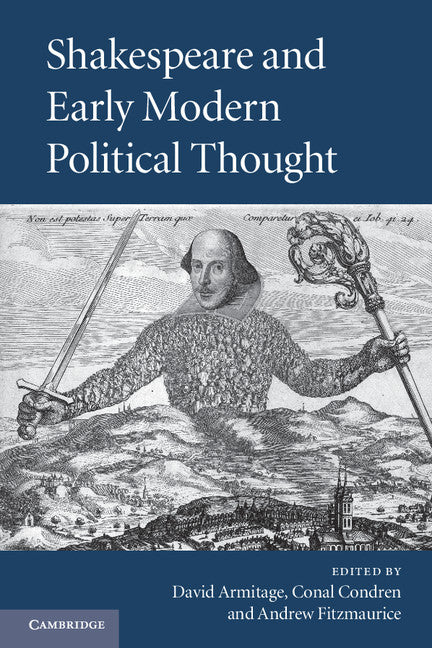Freshly Printed - allow 8 days lead
Couldn't load pickup availability
Shakespeare and Early Modern Political Thought
Leading literary scholars and historians examine Shakespeare's engagement with the characteristic questions of early modern political thought.
David Armitage (Edited by), Conal Condren (Edited by), Andrew Fitzmaurice (Edited by)
9781107692503, Cambridge University Press
Paperback / softback, published 26 July 2012
304 pages
23.7 x 15.2 x 1.4 cm, 0.49 kg
Review of the hardback: '… [this] book represents a new synthesis of method and approach, and the definitive starting point for any future exploration of the 'political' Shakespeare.' Ian Donaldson, University of Melbourne
This is the first collaborative volume to place Shakespeare's works within the landscape of early modern political thought. Until recently, literary scholars have not generally treated Shakespeare as a participant in the political thought of his time, unlike his contemporaries Ben Jonson, Edmund Spenser and Philip Sidney. At the same time, historians of political thought have rarely turned their attention to major works of poetry and drama. A distinguished international and interdisciplinary team of contributors examines the full range of Shakespeare's writings in order to challenge conventional interpretations of plays central to the canon, such as Hamlet; open up novel perspectives on works rarely considered to be political, such as the Sonnets; and focus on those that have been largely neglected, such as The Merry Wives of Windsor. The result is a coherent and challenging portrait of Shakespeare's distinctive engagement with the characteristic questions of early modern political thought.
Introduction David Armitage, Conal Condren and Andrew Fitzmaurice
Part I. Contexts: 1. Shakespeare's properties David Armitage
2. The active and contemplative lives in Shakespeare's plays Cathy Curtis
3. Shakespeare and the ethics of authority Stephen Greenblatt
4. Shakespeare and the politics of superstition Susan James
Part II. The Court: 5. Counsel, succession and the politics of Shakespeare's Sonnets Cathy Shrank
6. Educating Hamlet and Prince Hal Aysha Pollnitz
7. The corruption of Hamlet Andrew Fitzmaurice
8. Unfolding 'the properties of government': the case of Measure for Measure and the history of political thought Conal Condren
9. Shakespeare and the politics of co-authorship: Henry VIII Jennifer Richards
Part III. The Commonwealth: 10. Putting the city into Shakespeare's city comedy Phil Withington
11. Talking to the animals: persuasion, counsel and their discontents in Julius Caesar David Colclough
12. Political rhetoric and citizenship in Coriolanus Markku Peltonen
13. Shakespeare and the best state of a commonwealth Eric Nelson
Afterword: Shakespeare and humanist culture Quentin Skinner.
Subject Areas: History of ideas [JFCX], Shakespeare studies & criticism [DSGS], Literary studies: plays & playwrights [DSG], Literary studies: c 1500 to c 1800 [DSBD]


